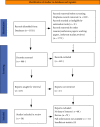Dietary Supplements as Source of Unintentional Doping
- PMID: 35496041
- PMCID: PMC9054437
- DOI: 10.1155/2022/8387271
Dietary Supplements as Source of Unintentional Doping
Abstract
Background: The substances used in sport could be divided into two major groups: those banned by the World Anti-Doping Agency and those which are not. The prohibited list is extremely detailed and includes a wide variety of both medicinal and nonmedicinal substances. Professional athletes are exposed to intense physical overload every day. They follow a relevant food regime and take specific dietary supplements, which is essential for the better recovery between trainings and competitions. However, the use of "nonprohibited" dietary supplements (DS) is not always completely safe. One of the risks associated with the use of dietary supplements is the risk of unintended doping-originating from contaminated products. The presence of undeclared compounds in the composition of DS is a serious concern. The aim of this study is to evaluate the risk of unintentional doping.
Materials and methods: Literature search was done through PubMed, Science Direct, Google Scholar, and Web of Science. Studies investigating the presence of undeclared compounds, in dietary supplements, banned by WADA met the inclusion criteria. The last search was conducted in June 2021. The present review is based on a total of 50 studies, which investigated the presence of undeclared compounds in DS.
Results: The total number of analyzed DS is 3132, 875 of which were found to contain undeclared substances. Most frequently found undeclared substances are sibutramine and anabolic-androgenic steroids.
Conclusion: More than 28% of the analyzed dietary supplements pose a potential risk of unintentional doping. Athletes and their teams need to be aware of the issues associated with the use of DS. They should take great care before inclusion of DS in the supplementation regime.
Copyright © 2022 Vanya Rangelov Kozhuharov et al.
Conflict of interest statement
The authors declare no conflict of interest.
Figures
References
-
- World Anti-Doping Agency. 2021. https://www.wada-ama.org/en .
Publication types
MeSH terms
LinkOut - more resources
Full Text Sources
Miscellaneous


